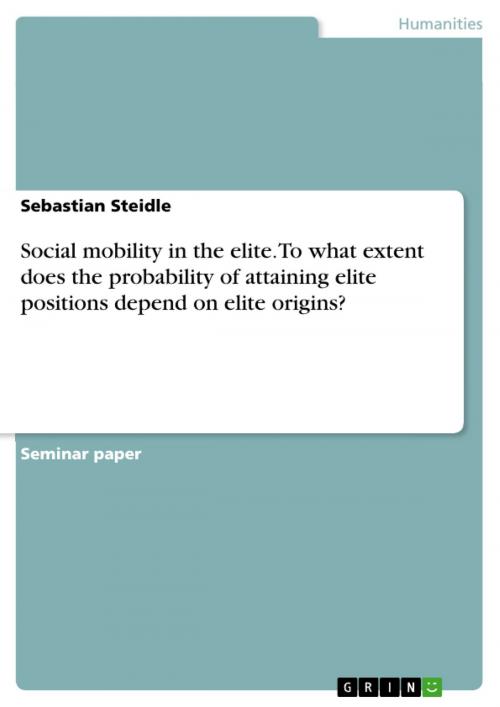Social mobility in the elite. To what extent does the probability of attaining elite positions depend on elite origins?
Nonfiction, Social & Cultural Studies, Social Science, Demography| Author: | Sebastian Steidle | ISBN: | 9783668243712 |
| Publisher: | GRIN Publishing | Publication: | June 21, 2016 |
| Imprint: | GRIN Publishing | Language: | English |
| Author: | Sebastian Steidle |
| ISBN: | 9783668243712 |
| Publisher: | GRIN Publishing |
| Publication: | June 21, 2016 |
| Imprint: | GRIN Publishing |
| Language: | English |
Seminar paper from the year 2015 in the subject Sociology - Social System, Social Structure, Class, Social Stratification, grade: 1,3, University of Tubingen (Institut für Soziologie), course: Social Mobility, language: English, abstract: Since C. Wright Mills' 'The Power Elite' (1956/2000), questions about the composition and cohesion of the top level of the stratification hierarchy, and also about the mechanisms behind recruitment to this level, have been central. This paper will examine different questions regarding elite recruitment. Firstly, what are the patterns of elite recruitment; does this level consist of separate elites or a common class? Do the different elite groupings vary with respect to degree of openness, i.e. what is the degree of elite mobility? In other words, to what extent does the probability of attaining elite positions depend on social origins, and more specifically, on elite origins? How important are economical, cultural and social resources for elite recruitment? Is there a development towards more openness or are there trends pointing in the opposite direction? This issue is important out of several reasons. Since it was observed, that even communist societies develop an extensive elite in form of party officials, it is widely believed, that the existence of some sort of ruling class is unavoidable in a modern mass society. Modern day policy doesn't lay the focus on the equality of outcome, but on the equality of opportunity instead. In a society with egalitarian values, the existence of an elite must be legitimized over merit and the effectiveness the society aspects from a chosen class. The perception, that elite positions are allocated in an open and fair contest is of normative meaning in a democracy.
Seminar paper from the year 2015 in the subject Sociology - Social System, Social Structure, Class, Social Stratification, grade: 1,3, University of Tubingen (Institut für Soziologie), course: Social Mobility, language: English, abstract: Since C. Wright Mills' 'The Power Elite' (1956/2000), questions about the composition and cohesion of the top level of the stratification hierarchy, and also about the mechanisms behind recruitment to this level, have been central. This paper will examine different questions regarding elite recruitment. Firstly, what are the patterns of elite recruitment; does this level consist of separate elites or a common class? Do the different elite groupings vary with respect to degree of openness, i.e. what is the degree of elite mobility? In other words, to what extent does the probability of attaining elite positions depend on social origins, and more specifically, on elite origins? How important are economical, cultural and social resources for elite recruitment? Is there a development towards more openness or are there trends pointing in the opposite direction? This issue is important out of several reasons. Since it was observed, that even communist societies develop an extensive elite in form of party officials, it is widely believed, that the existence of some sort of ruling class is unavoidable in a modern mass society. Modern day policy doesn't lay the focus on the equality of outcome, but on the equality of opportunity instead. In a society with egalitarian values, the existence of an elite must be legitimized over merit and the effectiveness the society aspects from a chosen class. The perception, that elite positions are allocated in an open and fair contest is of normative meaning in a democracy.















